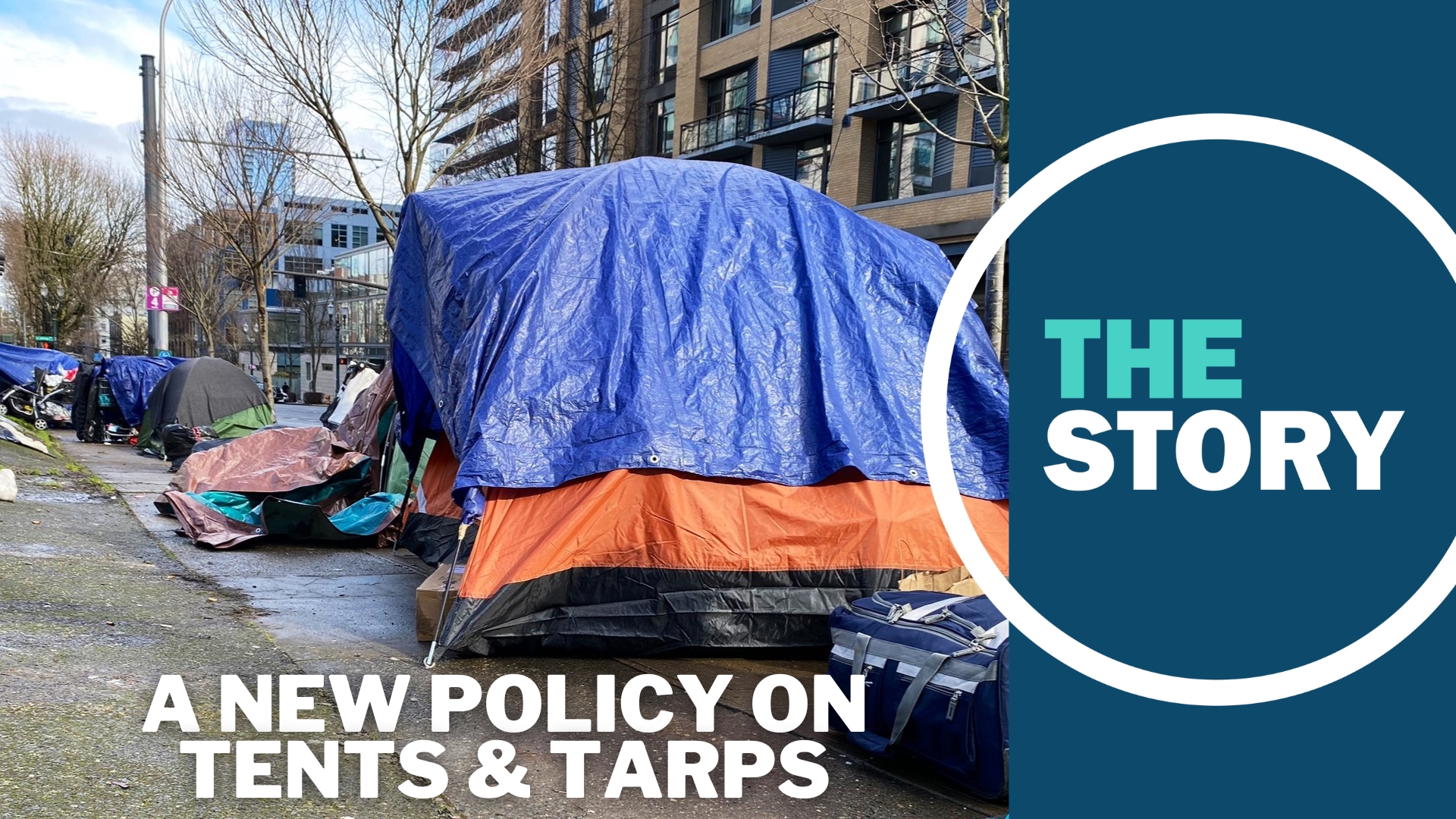PORTLAND, Ore. — Officials with the Multnomah County-helmed Joint Office of Homeless Services have introduced a new policy around one of Portland's more controversial issues: how the office buys up tarps and tents for distribution to homeless people living on the streets, often resulting in the city later paying to haul them away during sweeps.
The new proposal, adopted this week, includes limits on how often and who can pick up those supplies, namely restricting it to licensed nonprofit organizations that provide homeless services, and county officials pledge to track all of that information. During severe weather, the supplies would be more readily available.
Those at the county's supply center would prioritize buying "high-quality" and "durable" two-person tents and repair kits in an effort to cut down on waste. Licensed service providers doing direct outreach would have to agree to hand out only one tent per person served, along with shelter information and a list of where people are barred from setting up camp.
Not all county commissioners are on board with the proposal.
"I was disappointed," said Commissioner Julia Brim-Edwards. "From my perspective, we should be looking at ways we can be aligned with Mayor-elect Wilson’s goal to end unsheltered homelessness."
"It’s hard to formulate thoughts about that proposal," said Commissioner Sharon Meieran, laughing ruefully. "We have probably handed out at least 10 times as many (tents) as there are people living on the streets, and it doesn’t look like it's solved our homeless problem."
Defenders of Multnomah County's policies on tent and tarp distribution up to this point argue that it isn't a distraction from efforts to shelter and house homeless people, but a necessary stopgap. Even if there is sporadic shelter availability in the county, there are not nearly enough shelter beds to take in everyone each night — and in the meantime, people living on the street need the tools to survive.
"Tents and tarps are life-saving supplies, particularly when adequate shelter and housing are unavailable," the county policy proposal argues. "Tents and tarps mitigate the poor health outcomes associated with unsheltered homelessness and provide a limited level of safety, security, and privacy. They also serve as relationship-building resources for contracted outreach providers working to connect individuals with critical housing and health care services."
A JOHS report accompanying the policy proposal notes that cities and counties across the U.S. have different policies around tents and tarps, but many either provide them directly or fund community organizations that do, and some have created sanctioned areas where they can be used freely.
The city of Grants Pass has created a sanctioned space but does not support efforts to provide tents, the report adds, and Washington, D.C. actively discourages distribution of tents because there is sufficient shelter in the city to accommodate everyone.
"This approach would be unacceptable in the absence of adequate shelter space," the report says.
READ MORE: Distribution of tents and tarps scrutinized by Multnomah County, Portland and Gresham leaders
The new policy has caught the attention of John DiLorenzo, the attorney who represented Portlanders with disabilities in a 2023 lawsuit accusing the city of violating the Americans with Disabilities Act by allowing tents and tarps to block sidewalk access.
The city and DiLorenzo's clients settled the lawsuit after the city agreed on a more proactive approach to clearing camps that block ADA access. While the city has ostensibly been meeting those terms, DiLorenzo argues — outside of the courtroom — that the city's ongoing partnership with Multnomah County on homeless services could represent a violation of the settlement if the county does adopt this policy, something he has brought up before in the context of existing policy.
Under the settlement, Portland agreed not to let any contractors distribute tents and tarps. DiLorenzo argues that through the intergovernmental agreement Portland maintains with Multnomah County on JOHS, the county is itself a contractor.
DiLorenzo said he is already planning next steps in federal court come January.
"We're on a collision course and we're going to have to ask the federal court for orders to enforce the agreement," he told KGW. "It could have easily been avoided."
Just weeks ago, Portland's $30 million part in the Joint Office of Homeless Services appeared to be at an end, as a city council majority — composed of commissioners Rene Gonzalez, Dan Ryan and Mingus Mapps — moved to pull the city out.
The day after an election that saw both Gonzalez and Mapps lose to Keith Wilson in the mayor's race, the three commissioners abruptly announced an end to that effort. Ryan, who did succeed in winning a seat on the new 12-person city council, told KGW that they stood down at the request of Wilson, who argued that the new government should be the ones to decide.
However, it's possible that the new council could still decide to end the partnership with Multnomah County.

